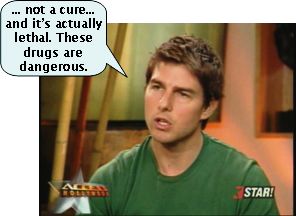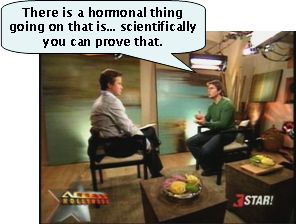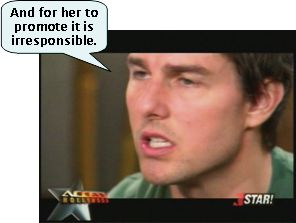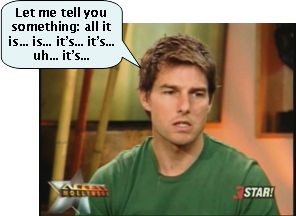Tom Cruise's (and Scientology's) crusade against Psychiatry and Psychology: Tom Cruise about postpartum depression
Tom Cruise |
Commentaries |
|
Ushma S. Neill, Executive Editor of The Journal of Clinical
Investigation in
Tom Cruise is dangerous and irresponsible:
Several interviews have aired in which
Tom Cruise has publicized his disdain for psychiatry and
the mental health profession (1,
2). In one interview, Cruise claimed to know the literature
on the history of psychiatry, chemical imbalances, and Ritalin
(methylphenidate), the attention-deficit hyperactivity disorder
(ADHD) drug (1).
In another, he called actress Brooke Shields irresponsible
for publishing a book on her battle with and treatment of
postpartum depression, since he believes vitamins and exercise
are all that is needed for treatment (2).
Ex-Scientologist
Being Helped by Prozac
A former personal aide to Scientology founder L. Ron Hubbard
has come forward to say that Prozac and therapy have finally
stopped the depression and suicidal ideation from which
she had suffered since 1976, despite treatment by Scientology
methods.
Scientology Schizo: His mom's religion said, "no meds." That
edict may have cost her life
Scientology, which now claims to have 10 million members,
and has been the brunt of ridicule (see Tom Cruise), skepticism
(see Tom Cruise) and craziness (see you-know-who), now has
its own murder. That is the focus of tomorrow night's "48
Hours Mystery."
|
|
 |
|
 |
Ushma S. Neill, Executive Editor of The Journal of Clinical
Investigation in
Tom Cruise is dangerous and irresponsible:
Let us move on to postpartum depression and chemical imbalances.
Cruise pulls no punches when asked about his thoughts on
the existence of chemical imbalances: he claims there is
no scientific evidence to verify they exist, based on his
reading of the scientific literature (1).
When asked about drugs like Paxil for the treatment of postpartum depression, he spoke plainly: “Let me tell you something: it is not a cure and it is actually lethal. These drugs are dangerous . . . There is a hormonal thing that is going on that is . . . scientifically, you can prove that. But when you talk about emotional chemical imbalances in people, there is no science behind that” (2). Again, I beg to differ and so does 50 years’ worth of literature (summarized in refs. 7, 8). While indeed other theories have been proffered to explain depression, the idea that chemical or genetic imbalances may underlie depression has been widely accepted. I wonder how an actor with Cruise’s educational background (no course of study noted past a high school degree) came to understand the medical literature and whether he would be conversant in the intricacies of the monoamine hypothesis or serotonin and noradrenaline signaling. The Telegraph's Trust Me I'm a Junior Doctor columnist, Max Pemberton, takes issue with the actor Tom Cruise's renewed attack on psychiatrists in Alien soul theory is no cure for depression:
Her words were cloaked in impenetrable language, which I
was informed could be further explained, at a price, on
one of the courses run by the centre.
Sharon wouldn't elaborate further - she wanted me to sign up for a course - but I've since learnt that Scientologists believe depression is best alleviated by removing the sufferer's covering of tiny disembodied souls of aliens dispersed by the Galactic Federation leader Xenu. Ah, yes, I think I missed that lecture at medical school. This is no joke, though. Scientologists are aiming their "teachings" at people with mental health problems, some of the most vulnerable in society. |
 |
|
 |
Ushma
S. Neill, Executive Editor of The Journal of Clinical Investigation
in
Tom Cruise is dangerous and irresponsible:
Brooke Shields said it best in her July 1, 2005, New York
Times Op-Ed column: “Comments like
those made by Tom Cruise are a disservice to mothers everywhere.
To suggest that I was wrong to take drugs to deal with my
depression, and that instead I should have taken vitamins
and exercised shows an utter lack of understanding about
postpartum depression and childbirth in general”
(9).
Rather than Shields being the irresponsible one, I have
found most women agree that it is Cruise’s message that
Paxil is lethal and that postpartum depression does not
exist that is irresponsible.
People have been helped by taking the appropriate medication to treat their depression, and this was the case with that former scientologist: The Psychiatric Times: Prozac Frees Ex-Scientology Leader from Depression
A personal aide to Scientology founder L. Ron Hubbard for
eight of her nearly 20 years with the group says that fluoxetine
(Prozac) and therapy have finally stopped the depression
and suicidal ideation she had suffered since 1976. "I have
to speak out" Hana
(Eltringham) Whitfield told The Psychiatric Times, "The
Scientologists choose the most prominent psychiatrists and
the most successful drugs to attack, That's why they attacked
Ritalin, and that's why they are now attacking Prozac."
|
| < Tom Cruise thinks psychiatrists are criminal | Did Tom Cruise help a child grow abnormally? > |
